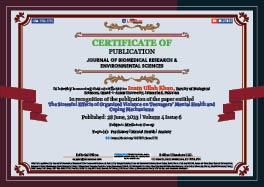Ulfat Tahireen1, Qurat-ul-Ain, Mahnoor Mehmood, Fehmida Bibi and Inam Ullah Khan*
Volume4-Issue6
Dates: Received: 2023-06-10 | Accepted: 2023-06-26 | Published: 2023-06-28
Pages: 1092-1099
Abstract
The study explored the impact of organized violence on teenagers' mental health and coping mechanisms. Various scales were used to assess between exposure to violence, coping strategies, and mental health. A sample of 300 teenagers aged 14 to 24 participated. The findings indicated reliable and consistent instruments. Correlations revealed a positive link between organized violence and internal health, and a negative link with cerebral well-being. Fear of terrorism and violence predicted both internal health and cerebral torture. Coping strategies such as avoidance and denial negatively affected cerebral well-being, while problem-concentrated coping had a positive impact. Gender differences were observed, with females reporting higher fear levels. Managing strategies accounted for variance in cerebral well-being and torture. Lastly, managing strategies acted as a moderator, influencing the relationship between violence and mental health. Avoidance and denial management were negatively associated with cerebral well-being, while problem-concentrated management positively predicted it. Multiple regression analysis revealed that managing strategies accounted for 32.1% of the variance in cerebral well-being. Managing strategies also explained 31.8% of the variance in cerebral torture. Additionally, the study found that managing strategies acted as a moderator and influenced the relationship between violence and mental health, accounting for 96 variations in the outcome variables of internal health.
FullText HTML
FullText PDF
DOI: 10.37871/jbres1772
Certificate of Publication

Copyright
© 2023 Tahireen U, et al. Distributed under Creative Commons CC-BY 4.0
How to cite this article
Tahireen U, Qurat-ul-Ain, Mehmood M, Bibi F, Khan IU. The Stressful Effects of Organized Violence on Teenagers’ Mental Health and Coping Mechanisms. 2023 June 28; 4(6): 1092-1099. doi: 10.37871/jbres1772, Article ID: JBRES1772, Available at: https://www.jelsciences.com/articles/jbres1772.pdf
Subject area(s)
References
- World Health Organization. Substance Abuse Department, World Health Organization. Department of Mental Health, Substance Abuse, World Health Organization. Global Status Report: Alcohol Policy. World Health Organization; 2004.
- Winefield HR, Gill TK, Taylor AW, Pilkington RM. Psychological well-being and psychological distress: Is it necessary to measure both? Psychology of Well-Being: Theory, Research and Practice. 2012 Dec;2(1):1-4. doi: 10.1186/2211-1522-2-3.
- Garakani A, Hirschowitz J, Katz CL. General disaster psychiatry. Psychiatr Clin North Am. 2004 Sep;27(3):391-406. doi: 10.1016/j.psc.2004.03.002. PMID: 15325484.
- World Health Organization. The World Health Report 2001: Mental Health: New Understanding, New Hope.
- Veit CT, Ware JE Jr. The structure of psychological distress and well-being in general populations. J Consult Clin Psychol. 1983 Oct;51(5):730-42. doi: 10.1037//0022-006x.51.5.730. PMID: 6630688.
- Ryff CD, Keyes CL. The structure of psychological well-being revisited. J Pers Soc Psychol. 1995 Oct;69(4):719-27. doi: 10.1037//0022-3514.69.4.719. PMID: 7473027.
- Al-Badayneh DM, Al-Khattar A, Al Hasan K. Fearing Future Terrorism: Perceived Personal, National, Regional and International Threats of Terrorism. In: Counter Terrorism in Diverse Communities. IOS Press; 2011. p.30-44.
- Malik F, Khawar R, Iftikhar R, Saeed S, Ilyas R. Development of terrorism impact scale: Initial validity and reliability analyses. Pakistan Journal of Social and Clinical Psychology. 2010 Dec 1;8(2):91-118.
- Carver CS, Scheier MF, Weintraub JK. Assessing coping strategies: a theoretically based approach. J Pers Soc Psychol. 1989 Feb;56(2):267-83. doi: 10.1037//0022-3514.56.2.267. PMID: 2926629.
- Stead R, Shanahan MJ, Neufeld RW. I’ll go to therapy, eventually: Procrastination, stress and mental health. Personality and Individual Differences. 2010 Aug 1;49(3):175-180. doi: 10.1016/j.paid.2010.03.028.
- Nunnally J, Bernstein IH. Psychometric theory. Thorndike RM, editor. In: Applied Psychological Measurement. New York: McGraw-Hill; 1995 Sep;19(3):303-305.
- Khalily MT. Mental health problems in Pakistani society as a consequence of violence and trauma: a case for better integration of care. Int J Integr Care. 2011 Oct;11:e128. doi: 10.5334/ijic.662. Epub 2011 Oct 7. PMID: 22128277; PMCID: PMC3225239.
- Box S. Group processes in family therapy: A psychoanalytic approach. Journal of Family Therapy. 1998 May;20(2):123-132. doi: 10.1111/1467-6427.00073.
- Seema M, Ravikesh T, Humera B. Psychological well-being: Reflections on an elusive construct and its assessment. Journal of the Indian Academy of Applied Psychology. 2013 Jul 1;39(2):189-195.
- Senf K, Liau AK. The effects of positive interventions on happiness and depressive symptoms, with an examination of personality as a moderator. Journal of Happiness Studies. 2013 Apr;14:591-612.
- Caron J, Liu A. A descriptive study of the prevalence of psychological distress and mental disorders in the Canadian population: comparison between low-income and non-low-income populations. Chronic Dis Can. 2010 Jun;30(3):84-94. PMID: 20609292.
- Kainth A, Hewitt A, Sowden A, Duffy S, Pattenden J, Lewin R, Watt I, Thompson D. Systematic review of interventions to reduce delay in patients with suspected heart attack. Emerg Med J. 2004 Jul;21(4):506-8. doi: 10.1136/emj.2003.013276. PMID: 15208248; PMCID: PMC1726390.
- Dooley BA, Fitzgerald A. My World Survey: National Study of Youth Mental Health in Ireland. Headstrong and UCD School of Psychology. 2012.